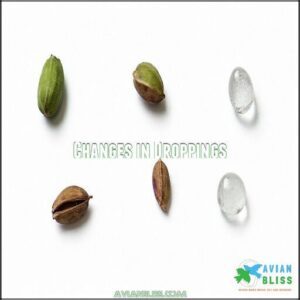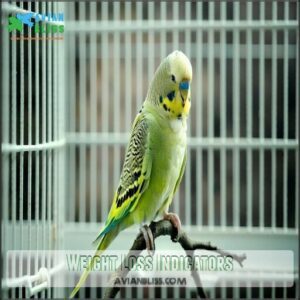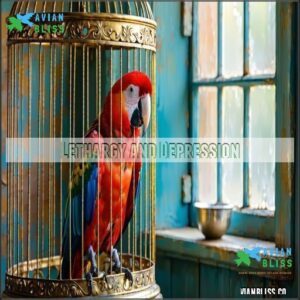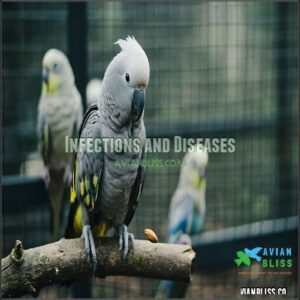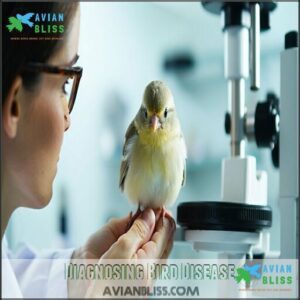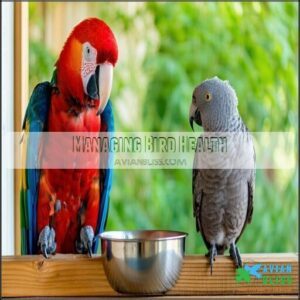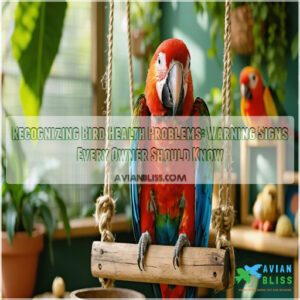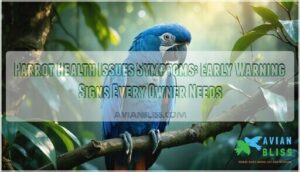This site is supported by our readers. We may earn a commission, at no cost to you, if you purchase through links.

Diseases like infections, respiratory issues, or digestive problems often cause birds to lose interest in food. Watch for other clues like weight loss, unusual droppings, or a sluggish attitude.
Stress, poor diet, or even environmental changes could also play a role. If Polly’s plate has been untouched for over a day, don’t wait—schedule a vet visit.
Birds hide illness well, so catching it early can save their lives. Curious about how to spot subtle signs or help your feathered friend bounce back? Keep reading to learn more about supporting your bird’s overall health.
Table Of Contents
- Key Takeaways
- Bird Appetite Loss Signs
- Causes of Decreased Appetite
- Recognizing Bird Illness
- Diagnosing Bird Disease
- Managing Bird Health
- Frequently Asked Questions (FAQs)
- Why does my bird have a decreased appetite?
- Do birds lose weight if they are depressed?
- What are the symptoms of anorexia & lethargy in birds?
- Do stressed birds lose weight?
- How do you know if a bird has a gastrointestinal illness?
- How do you know if a bird is losing weight?
- What causes loss of appetite in birds?
- What does it mean when a bird stops eating?
- What to do when your bird doesn’t eat?
- How does seasonal change affect bird appetite?
- Conclusion
Key Takeaways
- Watch for red flags like weight loss, unusual droppings, or sluggish behavior since birds hide illness well.
- Stress, infections, and poor diet are common causes of appetite loss, so prioritize a clean environment, balanced nutrition, and low noise levels.
- Regularly check your bird’s droppings, weight, and overall behavior to catch potential health issues early.
- If your bird skips meals or shows symptoms like lethargy, consult an avian vet immediately to ensure their well-being.
Bird Appetite Loss Signs
When your bird stops eating like usual, it’s a big red flag that something’s wrong.
From unusual droppings to sudden weight loss, these appetite changes aren’t just quirks—they’re your bird’s way of telling you it needs help.
These appetite changes, including sudden weight loss, are indicators that require immediate attention to ensure the bird’s health and well-being.
Changes in Droppings
Bird droppings tell a story! Changes in color, consistency, or frequency can scream, “Something’s not right.”
Bird droppings are the hidden diary of your bird’s health—watch for color and texture changes to uncover potential problems.
Watch for these:
- Greenish or yellow hues (signs of bird digestive issues).
- Watery consistency or undigested food (potential bird illness symptoms).
- Changes in urates (the white part of droppings).
When in doubt, a bird droppings analysis reveals hidden avian disease signs! Specialized tests offer detailed diagnostic insights to help identify potential bird illness symptoms and understand the importance of monitoring changes in color.
Loss of Interest in Food
When your feathered buddy skips meals or suddenly stops munching on their favorite snack, it’s a glaring red flag.
Skipping meals or refusing favorite snacks is your bird’s way of saying, "Something’s wrong—help me now!
Bird food refusal, or avian inappetence, isn’t "just a phase."
With their high metabolic rates, even a short lapse in eating habits can spell trouble. Food aversion or regurgitation causes might link to stress or illness. Keep watch!
Weight Loss Indicators
If your bird’s breastbone looks more prominent or there’s noticeable muscle atrophy, it’s time to act.
Birds hide illness well, but significant weight loss or malnourishment from a decreased appetite isn’t subtle.
Keep an eye out for dehydration signs or rapid weight fluctuation.
Regular weight monitoring can help catch problems early, before bird anorexia takes a toll.
A sudden drop can indicate underlying fungal infections, which may signal a serious health issue.
Lethargy and Depression
When weight loss sneaks in, keep an eye out for lethargy and signs of bird depression. A once-cheerful bird sitting quietly, sleepy, or ignoring its surroundings might be struggling.
Provide Cage Enrichment and Foraging Opportunities to spark curiosity and Mental Stimulation. Don’t forget:
- Set up Social Interaction
- Encourage Light Exposure
- Watch for changes in bird behavior
- Review overall activity levels
- Verify proper hydration
Causes of Decreased Appetite
Your bird’s appetite can drop for a variety of reasons, from stress to illness.
It’s like when you lose your appetite on a bad day—except for birds, it might mean something much more serious.
Stress and Anxiety
Sometimes, appetite dips aren’t about illness but stress.
Routine changes, loud noises, or poor cage placement can rattle bird behavior.
Lack of environmental enrichment or proper social interaction might leave them anxious.
Even mishandling can upset their delicate nature.
Watch for behavioral changes, like feather plucking or pacing—it’s their way of saying, "I’m stressed, help!
Infections and Diseases
Not eating? Infections like psittacosis or fungal infections, such as candidiasis, might be to blame.
Viral diseases, bacterial infections, and parasitic diseases often trigger bird appetite loss. Look out for bird infection symptoms like nasal discharge or crusty eyes.
Avian illnesses aren’t just a feathered flu—they can pose zoonotic risks. Catch bird disease signs early to protect their health!
Birds can also suffer from avian gastric yeast, which leads to chronic weight loss.
Environmental Factors
A chaotic bird environment can mess with your bird’s appetite.
Loud noises, dirty cages, or the arrival of new pets ramp up bird stress.
Keep noise levels low, the cage spotless, and fresh water accessible.
Mental stimulation, like toys or puzzles, reduces boredom and improves mood.
A calm, clean setup supports a healthy bird diet and happier mealtime habits.
Birds may also experience stress that impacts their appetite if predators visit feeders, which can be a significant factor in their overall mental stimulation and appetite.
Nutritional Deficiencies
If your bird’s diet is all seeds, you might unknowingly be setting them up for issues like bird malnutrition.
Nutritional deficiencies sneak in fast, bringing trouble:
- Vitamin A deficiency weakens immunity.
- Calcium and iodine gaps harm bones.
- Mineral imbalance disrupts overall health.
- Lack of variety stunts energy.
- Balanced dietary supplementation fights malnourishment effects.
Consider using a bird vitamin supplement to address these deficiencies.
Healthy ingredients save feathers and singing!
Recognizing Bird Illness
Spotting when your bird is sick can feel tricky since they’re experts at hiding it.
But small changes in feathers, behavior, or even chirps can reveal if something’s wrong.
Feather Condition Changes
Feather condition says a lot about your bird’s health.
Dull feathers, molting issues, or bald patches? That’s a red flag.
Feather plucking or poor preening behavior can signal stress or illness.
Watch for changes in feather color or structure too.
Healthy feathers are sleek and uniform.
When in doubt, trust your gut—consult your vet if your feathered friend looks or acts off!
| Feather Problem | Possible Cause | Action Step | Severity |
|---|---|---|---|
| Dull Feathers | Poor diet or illness | Improve diet, see a vet | Moderate |
| Feather Plucking | Stress or boredom | Enrich bird’s environment | High |
| Color Changes | Nutritional deficits | Adjust nutrition, consult vet | Moderate |
| Preening Issues | Discomfort or mites | Check for parasites | High |
Behavioral Changes
Sometimes, it’s the little things you notice first.
Is your bird more tired or showing bird lethargy? Pay attention to behavioral changes like activity reduction, social withdrawal, or altered sleep patterns.
If they’re acting skittish with a fear response or ignoring you, that’s a red flag. Bird behavior abnormalities often signal illness—trust your gut and seek help!
Vocalization Changes
Noticing sound shifts? Changes in your bird’s vocalizations could be whispering trouble.
Keep an ear out for these red flags:
- Distress Calls or Silence Signals: Sudden quietness or odd sounds hint at illness.
- Hoarseness Causes: A raspy tone isn’t charming; it screams respiratory issues.
- Reduced Singing: If your parrot stopped talking or songs vanish, investigate.
Sound’s their language—listen closely!
Physical Symptom Indicators
When your bird’s eyes look leaky, wings droop, or they wobble like they’ve had one too many seeds, it’s time to pay attention.
Physical symptoms like skin abnormalities, feather changes, or even difficulty standing signal bird health problems. Check for these signs in your feathered buddy:
| Symptom | What to Look For | Possible Cause |
|---|---|---|
| Eye Discharge | Watery or crusty eyes | Infection or irritation |
| Drooping Wings | Weak appearance | Sickness or exhaustion |
| Balance Issues | Wobbling or falling | Neurological troubles |
Stay sharp—you know your bird best, and recognizing these signs can help prevent more serious issues, ensuring your feathered buddy remains healthy, and it is crucial to be aware of physical symptoms and neurological troubles to provide the best care.
Diagnosing Bird Disease
Spotting what’s wrong with your bird starts with a few key steps, and it’s not as tricky as it sounds.
A vet visit, a close look at droppings, and keeping track of weight are your best tools to figure out the problem.
Veterinary Examination
A veterinary examination is like a detective uncovering clues about your bird’s health.
The avian veterinarian conducts a physical examination, looking for signs like weight loss or unusual lumps.
They may use diagnostic testing or sample collection for a deeper bird health assessment.
With their expertise, they’ll create a treatment plan to set your feathered friend on the path to recovery.
Droppings Analysis
Spotting bird health problems? Take a close look at droppings. Changes in droppings consistency or color variations can hint at bird disease.
Undigested food might signal digestive trouble, while microscopic checks can reveal parasite detection or bacterial infections.
Bird droppings diseases can transmit over 60 types of infections. Sick birds hide symptoms, but their droppings never lie! Stay sharp; it’s your first clue in bird disease prevention.
This approach helps in early detection and is crucial for the health of your birds, emphasizing the importance of monitoring droppings.
Weight Monitoring
Keeping an eye on your bird’s weight is like checking the gas gauge on a road trip.
Use regular weighing to spot weight fluctuation early. A prominent breastbone often hints at bird weight loss.
Decreased appetite in birds can signal health problems, so if your feathered friend skips meals or looks thinner, it’s time to act.
Medical History Review
You can’t solve bird health problems without checking their backstory. A parrot not eating might link to prior illnesses or missed vaccinations.
Review genetic predispositions or past injuries too. Ask your vet about medication history.
- Review vaccination records to rule out preventable diseases.
- Check for untreated injuries.
- Note genetic issues common in your bird’s species.
- Discuss past medication with an avian veterinary specialist.
Managing Bird Health
Taking care of your bird’s health doesn’t have to feel overwhelming if you focus on the basics.
A clean cage, fresh water, good food, and regular check-ups work wonders to keep your feathered buddy happy and healthy!
Providing Nutritious Diet
A balanced diet is the secret to great bird health.
Mix fresh foods like leafy greens, carrots, and berries with pellets and a little seed variety. Watch their appetite closely—birds can’t live off treats forever!
Vitamin supplements may help fill gaps, but check with your vet. Think of avian nutrition as their life insurance policy.
A healthy diet also supports essential bird nutrients that boost immunity and overall bird health.
Maintaining Clean Environment
A dirty cage is a recipe for illness, so embrace regular bird cage cleaning!
Focus on cage sanitation by scrubbing perches, disinfecting toys, and washing feeders weekly.
Water hygiene is key—replace it daily to avoid bacteria.
Good sanitation practices like this reduce stress and prevent disease. Using proper cage cleaner is also essential for bird health.
Your bird deserves a sparkling, clean environment—it’s their happy place, after all!
Encouraging Hydration
A hydrated bird is a happy bird! Fresh water sources are non-negotiable—check and refill daily.
If your feathered friend seems off, try electrolyte solutions recommended for birds. Recognizing dehydration early, like dry droppings or dull eyes, can save their life.
Don’t hesitate to explore veterinary hydration methods if needed. Good hydration is bird care 101!
Regular Veterinary Check-ups
Regular veterinary checkups are a lifesaver for bird health.
Early detection helps avoid big issues later. Partner with an avian vet to stay ahead.
- Get expert advice to establish health baselines.
- Preventative care saves you future stress (and money).
- Regular bird veterinary consultations keep your feathered friend chirping happily.
Invest in bird vet care—it’s worth every penny for their well-being! Regular checkups are a key part of responsible bird ownership and can help prevent issues, making them a worthwhile investment.
Frequently Asked Questions (FAQs)
Why does my bird have a decreased appetite?
Imagine your bird’s appetite as a traffic signal—it slows down when something’s off.
Stress, infections, parasites, poor diet, or even boredom could be the culprits.
Watch for other symptoms and consult a vet if needed.
Do birds lose weight if they are depressed?
Yes, birds can lose weight if they’re depressed.
Just like us, stress or sadness messes with their appetite and energy.
If your bird feels down, it’s time to cheer them up and consult a vet.
What are the symptoms of anorexia & lethargy in birds?
Lethargy and loss of appetite in birds may show up as droopy wings, dull feathers, or a lack of chirping enthusiasm.
If your bird skips meals or naps too much, call the vet quickly!
Do stressed birds lose weight?
Stressed birds can definitely lose weight.
Their fast metabolism means even slight stress—like a big move or loud noises—can disrupt eating.
Watch for less food intake or weight changes, and offer a calm, comfy space!
How do you know if a bird has a gastrointestinal illness?
Watch for diarrhea, undigested food, or changes in droppings.
A bird with a gastrointestinal illness often eats less, looks weak, or loses weight.
If symptoms persist, don’t delay—get your little buddy to the vet!
How do you know if a bird is losing weight?
You’ll notice weight loss in birds when their keel bone becomes more pronounced or their feathers look loose and puffy.
Regularly weigh your bird to track changes.
Sudden weight loss? It’s time to see a vet!
What causes loss of appetite in birds?
Think of it like losing your appetite from stress—birds stop eating due to things like illness, infections, poor hygiene, or parasites.
Even small changes, like dirty feeders or new pets, can impact their cravings.
What does it mean when a bird stops eating?
When a bird stops eating, it’s often a signal something’s wrong.
Illness, stress, or environmental changes can mess with their appetite.
Act quickly—catching issues early keeps your bird chirping and healthy.
What to do when your bird doesn’t eat?
When your feathered friend won’t snack, it’s like a red flag waving.
Check their environment—cleanliness, stress triggers, diet changes—then offer fresh water.
If appetite stays low, visit an avian vet pronto for expert help.
How does seasonal change affect bird appetite?
Seasonal changes can tweak your bird’s appetite.
Cooler weather might ramp up their energy needs, while warmer seasons could slow eating.
It’s like us craving soup in winter or lighter snacks in summer—totally normal!
Conclusion
Spotting subtle signs of sickness, like sluggishness or weight loss, can save your bird’s life.
Don’t let decreased appetite disease sneak up on your feathered friend. Stress, infections, or poor nutrition are common culprits, so take action fast.
Keep their environment clean, provide a balanced diet, and watch for odd behaviors.
If you’re unsure, schedule a vet visit pronto—birds hide illness well. A happy, healthy bird is worth the effort, and Polly will thank you for the effort!
- https://www.petmd.com/bird/behavior/how-tell-if-your-bird-unhappy-or-stressed-and-what-do
- https://www.merckvetmanual.com/bird-owners/disorders-and-diseases-of-birds/disorders-affecting-multiple-body-systems-of-pet-birds
- https://www.avianhealthservices.com/signs-of-sickness.html
- https://www.quora.com/My-bird-seems-listless-and-isn-t-eating-as-much-as-normal-what-could-be-wrong
- https://www.mountpleasant.com.sg/education/common-health-problems-every-pet-bird-owner-should-know/

